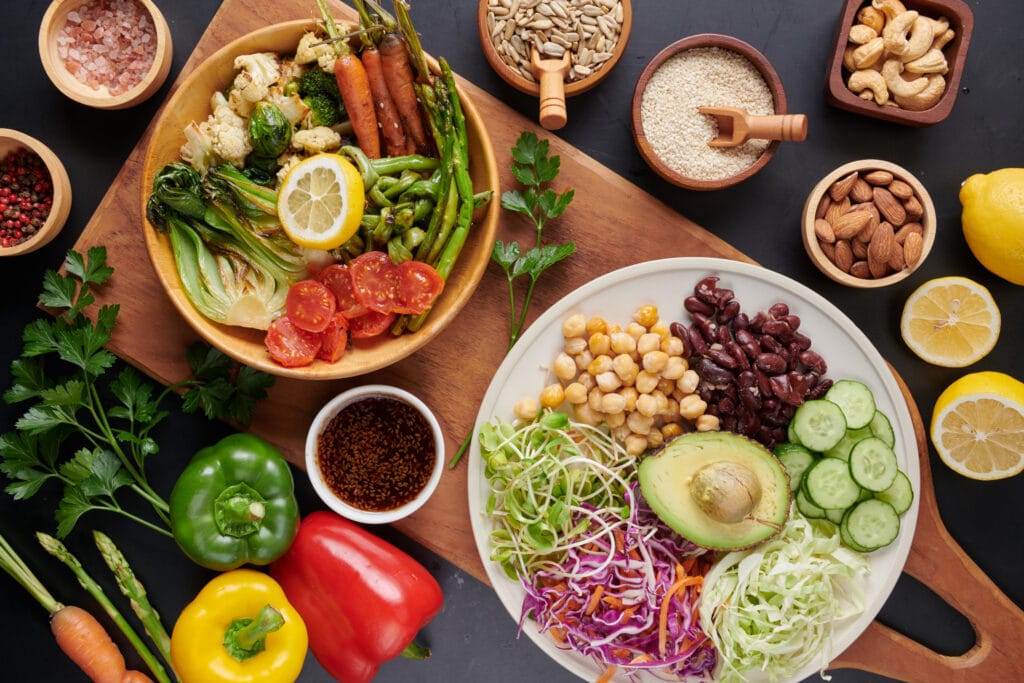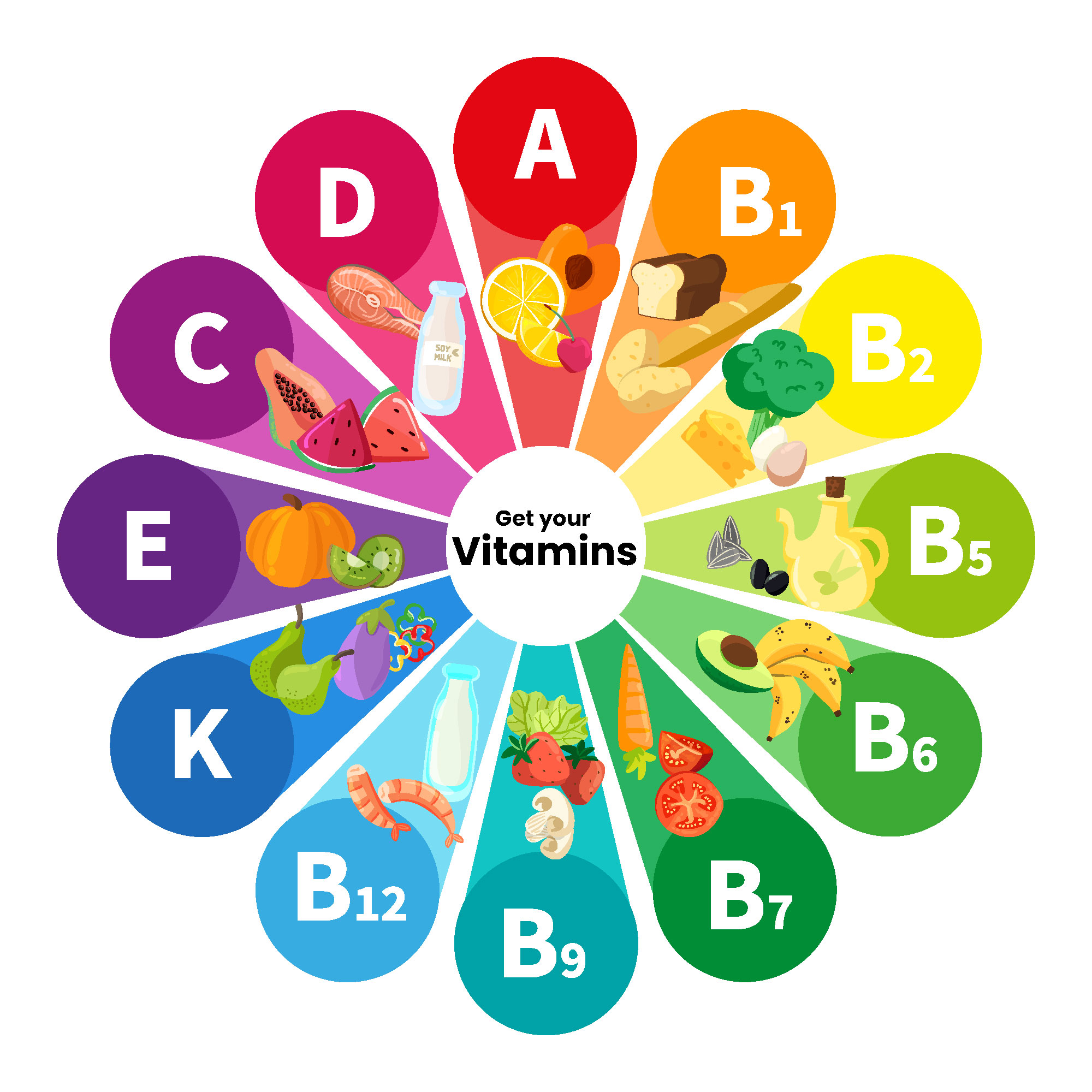In recent years, veganism has gained significant popularity, with more people adopting plant-based diets for a variety of reasons, including health, animal welfare, and environmental sustainability. However, transitioning to a vegan diet necessitates a deeper understanding of nutrition, particularly regarding the role of vitamins.
This article explores the efficacy of vitamins in vegan diets, aiming to provide insights into how individuals can achieve optimal health while adhering to plant-based eating.
Content
ToggleUnderstanding Vegan Diets
What is a Vegan Diet?
A vegan diet eliminates all animal products, including meat, dairy, eggs, and even certain additives derived from animals. Instead, it focuses on a variety of plant-based foods such as:
- Fruits and vegetables
- Whole grains
- Legumes
- Nuts and seeds
- Plant-based oils
However, while a vegan diet can offer numerous health benefits, it may also present challenges in obtaining essential nutrients, particularly specific vitamins that are predominantly found in animal products.
Health Benefits of a Vegan Diet
Research indicates that a well-planned vegan diet can lead to several health benefits:
- Lower Risk of Chronic Diseases: Vegan diets are often rich in fruits, vegetables, whole grains, and legumes, contributing to lower cholesterol levels and reduced risks of heart disease, diabetes, and certain cancers.
- Weight Management: A plant-based diet is typically lower in calories and saturated fats, making it easier for individuals to maintain a healthy weight.
- Enhanced Digestive Health: The high fiber content in vegan diets supports gut health and regular bowel movements.
Despite these benefits, individuals following a vegan diet must pay close attention to their vitamin intake to avoid deficiencies.
Essential Vitamins for Vegans
Vitamin B12: The Key Concern
The Role of Vitamin B12
Vitamin B12 is crucial for producing red blood cells, maintaining the nervous system, and synthesizing DNA. However, it is primarily found in animal products. As such, vegans are at a higher risk of developing a deficiency. See more about this here
Symptoms of Deficiency
Vitamin B12 deficiency can lead to:
- Fatigue
- Weakness
- Neuropathy (nerve damage)
- Cognitive impairments
Supplementing Vitamin B12
To ensure adequate intake, vegans should consider supplementation or consume fortified foods, such as plant-based milk, breakfast cereals, and nutritional yeast.
Vitamin D: The Sunshine Vitamin
Importance of Vitamin D
Vitamin D is essential for bone health, immune function, and overall well-being. It can be synthesized by the body through exposure to sunlight, but dietary sources are often limited in a vegan diet.
Vitamin D Sources for Vegans
Vegans can obtain Vitamin D through:
- Fortified Foods: Some plant-based milk and orange juice are fortified with Vitamin D.
- Mushrooms: Certain varieties exposed to UV light can provide Vitamin D2, although Vitamin D3 is the preferred form for supplementation.
Supplements for Optimal Levels
During periods with limited sunlight exposure, particularly in winter months, taking a Vitamin D supplement can help maintain adequate levels.
Iron: A Vital Mineral
The Role of Iron
Iron is crucial for transporting oxygen in the blood and is necessary for energy metabolism. Vegans may find it challenging to meet their iron needs due to the lower bioavailability of non-heme iron found in plant foods.
Symptoms of Iron Deficiency
Iron deficiency can result in:
- Anemia
- Fatigue
- Weakness
Maximizing Iron Absorption
Vegans should focus on iron-rich plant foods, such as:
- Legumes (lentils, chickpeas)
- Tofu
- Quinoa
- Dark leafy greens
To enhance absorption, it is beneficial to consume vitamin C-rich foods (such as citrus fruits, tomatoes, and bell peppers) alongside iron sources.
Omega-3 Fatty Acids: Important Fats
Understanding Omega-3s
Omega-3 fatty acids are essential for brain health, reducing inflammation, and supporting cardiovascular health. While they are abundant in fish, vegans can obtain them from plant sources.
Plant-Based Sources of Omega-3s
Vegans can incorporate the following sources into their diets:
- Flaxseeds
- Chia seeds
- Walnuts
- Hemp seeds
Consider Supplementing with Algal Oil
Vegans may also consider algae-based supplements, which provide DHA and EPA, the beneficial forms of Omega-3 fatty acids typically found in fish.
Calcium: Crucial for Bone Health
The Importance of Calcium
Calcium is essential for maintaining strong bones and teeth, as well as supporting muscle function and nerve signaling. Many dairy products are primary sources of calcium, making it challenging for vegans to meet their needs.
The Importance of Calcium
Calcium is essential for maintaining strong bones and teeth, as well as supporting muscle function and nerve signaling. Many dairy products are primary sources of calcium, making it challenging for vegans to meet their needs.
Vegan Sources of Calcium
Vegans can get from several plant-based sources, including:
- Fortified Plant Milks: Many almond, soy, and oat milks are fortified with calcium.
- Leafy Greens: Vegetables such as kale, collard greens, and bok choy are excellent sources.
- Tofu: Particularly the calcium-set varieties, can significantly contribute to calcium intake.
- Almonds and Sesame Seeds: Both are nutrient-dense options high in calcium.
Supplementation Considerations
For those who struggle to meet their calcium needs through diet alone, calcium supplements can help. It’s essential to speak with a healthcare provider to determine the appropriate dosage and form.
Vitamin K: Essential for Blood Health
The Role of Vitamin K
Vitamin K is vital for proper blood clotting and maintaining bone health. It comes in two forms: K1 (found in green leafy vegetables) and K2 (found in animal products and fermented foods).
Plant-Based Sources of Vitamin K
Vegans can easily incorporate Vitamin K1 through:
- Kale
- Spinach
- Brussels Sprouts
- Broccoli
Eating a variety of these vegetables ensures adequate Vitamin K intake.
The Importance of a Well-Balanced Diet
To thrive on a vegan diet, it’s crucial to prioritize a well-balanced intake of macronutrients (carbohydrates, proteins, fats) alongside essential vitamins and minerals. Adopting a diverse range of plant foods can help mitigate nutritional deficiencies while supporting overall health.
Planning Nutrient-Dense Meals
Creating nutrient-dense meals can be accomplished by:
- Incorporating colorful fruits and vegetables: Aim for a variety of colors to obtain a broad spectrum of vitamins and phytochemicals.
- Including whole grains and legumes: These not only provide fiber but also deliver essential nutrients, including protein and minerals.
- Choosing healthy fats: Incorporating avocados, nuts, and seeds can help meet fatty acid requirements.
The Role of Supplementation in Vegan Diets
When Is Supplementation Necessary?
While a well-planned vegan diet can provide most necessary nutrients, supplementation may be crucial for some vitamins and minerals:
- Vitamin B12: Regular supplementation is often necessary due to its absence in plant foods.
- Vitamin D: During the winter months or for individuals with limited sun exposure, supplementation could be beneficial.
- Omega-3 Fatty Acids: Individuals not consuming alga-based supplements may need to enhance their intake through seeds or consider supplementation too.
Choosing Quality Supplements
To ensure that the supplements chosen are effective and safe, consider the following:
- Third-Party Testing: Choose supplements that have been tested for quality and purity by an independent organization.
- Bioavailability: Select forms of vitamins that are easily absorbed by the body.
- Consultation with Healthcare Providers: Discuss supplementation with a healthcare provider or a registered dietitian to ensure individual needs are met.
Overcoming Challenges in Adopting a Vegan Diet
Nutrition Education
Education plays a critical role in the successful adoption of a vegan diet. Individuals should familiarize themselves with nutrient requirements, food sources, and meal planning strategies.
Reading Labels
For packaged foods, reading labels for nutritional content can help vegans ensure they are meeting their dietary needs, particularly for vital nutrients like Vitamin B12 and calcium.
Engaging with Supportive Communities
Many individuals find success in adopting a vegan lifestyle by connecting with supportive communities. These can provide valuable resources, meal ideas, and encouragement to maintain a nutritious and balanced vegan diet.
Cooking Classes and Workshops
And, participating in vegan cooking classes or workshops can introduce individuals to new recipes and cooking methods, making it easier to prepare balanced meals at home.
Conclusion
Finally, the efficacy of vitamins in vegan diets is a crucial topic for those seeking to maintain optimal health while adhering to a plant-based lifestyle. Understanding the essential vitamins and how to obtain them—whether through food, supplements, or fortified products—is vital for preventing deficiencies and promoting well-being.
With proper planning, education, and a focus on nutrient-dense foods, individuals can enjoy the many health benefits of a vegan diet while ensuring they meet their nutrient requirements.
As growing research continues to support the positive impacts of a well-balanced vegan diet, individuals should feel empowered to embrace a lifestyle that is not only beneficial for themselves but also for the planet.



